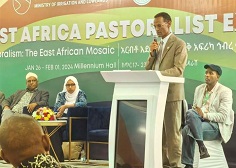By Yeneneh Sisay – In order to make land use among The Intergovernmental Authority on Development (IGAD) member countries fair and conflict-free, traditional conflict resolution methods should be used as an alternative, suggested Shadrack Omondi, IGAD’s land affairs specialist.
It is important to use alternative conflict resolution methods to ensure women’s benefits and representation, according to Shadrack Omondi. “If IGAD member countries follow the following modern legal framework regarding land use and indigenous knowledge and conflict resolution methods accepted in their respective countries, it is possible to avoid conflicts over land and achieve fair and inclusive land use,” says Shadrack Omondi.
The IGAD region stretches over an area of 5.2 million km2 that comprises the countries of Djibouti, Eritrea, Ethiopia, Kenya, Somalia, South Sudan, Sudan and Uganda. It is recalled that the East African countries’ Pastoral and Livestock Exhibition was opened at the Millennium Hall in Addis Ababa, Ethiopia last Thursday and about 350 representatives of the six member countries participated in the exhibition.
As 70% of the land in East African countries is not suitable for farming during the normal rainy season, it is said that the countries should pay special attention to their animal resources to get out of poverty and work for their development by reviewing the laws they follow in the field of pastoralism and animal resource development.
It is suggested that due to the fact that global climate change is the cause of drought every year, especially when pastoralists move to places where there is no drought in search of fodder for their animals, the governments of IGAD member countries should work hard on the development of animal fodder in order to avoid the conflicts that arise due to grazing grass in the border area and for the drought season.
Regarding the need to formulate a sustainable strategy in relation to animal fodder stocks, other recommendations were presented and discussed at the exhibition. IGAD member countries have the largest number of livestock and pastoral areas in Africa, so the governments of the region need cooperation to use this resource properly, said Dr. Dereje Waqjra, Director of IGAD Pastoral Animals and Lowland Environment Center, in his speech at the closing of the three-day event held at the Millennium Hall last week.
